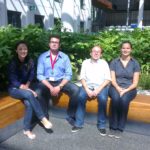Project Title: Pathogenic neovascularization in diabetic retinopathy and age-related macular degeneration: the role of monocyte-derived pro-angiogenic cells
- Willem Dik, PhD
- Erasmus Medical Center
- Department of Immunology
- Rotterdam, The Netherlands
- $103,500 for one year
 Dr. Dik’s research focuses on identification of cellular and molecular mechanisms underlying (chronic) inflammatory processes and related tissue and organ dysfunction, with the specific aim to use this information to guide the development of (novel) protective measures to be used in the clinic. Previously, a strong focus has been on ocular disease as proliferative vitreoretinopathy (PVR), uveitis, and Graves’ ophthalmology. Various types of patient tissue have been used in the studies, which made extensive use of in-vitro approaches (stimulation of retinal endothelial cells or retinal pigment epithelial cells with ocular fluids, serum, plasma, or specific growth factors).
Dr. Dik’s research focuses on identification of cellular and molecular mechanisms underlying (chronic) inflammatory processes and related tissue and organ dysfunction, with the specific aim to use this information to guide the development of (novel) protective measures to be used in the clinic. Previously, a strong focus has been on ocular disease as proliferative vitreoretinopathy (PVR), uveitis, and Graves’ ophthalmology. Various types of patient tissue have been used in the studies, which made extensive use of in-vitro approaches (stimulation of retinal endothelial cells or retinal pigment epithelial cells with ocular fluids, serum, plasma, or specific growth factors).
Dr. Dik’s IRRF-supported research aims to determine for both diabetic retinopathy (DR) and AMD: 1) distinctive phenotypic features of monocytes in peripheral blood; 2) the capacity of peripheral blood monocytes to differentiate into pro-angiogenic cells A(PAC); 3) the angiogenic functionality of PAC differentiated from blood monocytes.
